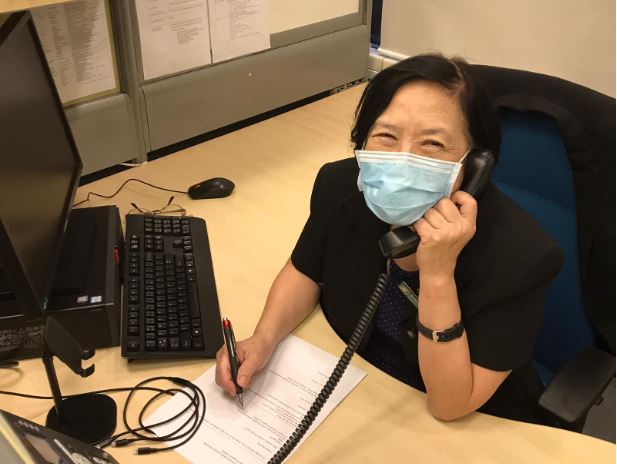When the pandemic stopped our Senior Patient Experience Managers from going to the wards, they found other ways to engage the most vulnerable of patients - those placed in isolation for suspected or confirmed COVID-19.
When COVID-19 stopped our Senior Patient Experience Managers or SPEMs from going to the wards from mid-February, the SPEMs found other ways to provide a listening ear and emotional support to the most vulnerable – patients placed in isolation because they were suspected or confirmed to have the COVID-19 virus.
To engage this group more effectively, the SPEMs enlisted the help of medical social workers (MSWs). As these patients were not allowed visitors, their stay in hospital was more difficult than other patients, and feelings of loneliness, fear and anxiety could quickly overwhelm them.
“We wanted to help patients get through that difficult period of isolation and respond to any concerns promptly,” said SPEM Susan Quek Hwee Koon. “The most challenging aspect was managing their emotions. Sometimes patients disclosed or shared their difficulties in coping with their emotional, psychological, social, financial and care problems arising from isolation. That was where the MSW came in – we collaborated with them to deliver psychosocial care for these patients. The support ranged from practical assistance like helping these patients to top-up their phone cards to advocating for foreign workers by speaking with their employers on their salary and employment matters, and providing emotional support through phone counselling.”
Recalled Head of MSW Olivia Khoo, “There was a foreign worker cohorted in a 4-bedder room at SGH who became extremely distraught at the thought of being discharged to a single room in an isolation facility where he would be alone. He had previously witnessed a suicide and feared being alone. Besides providing support, we worked with MOH to ensure that the patient was discharged to a quarantine facility where he had a roommate for support.”
At the start of each working day, the SPEMs would go through the list of wards with patients suspected or confirmed to have COVID-19, as well as those with acute respiratory infections. Patients in intensive care were excluded, but the others were assigned to the SPEMS. A huddle would take place with Office of Patient Experience (OPE) Director Karen Perera and Ms Khoo to discuss the cases, in particular the more challenging ones.

At the height of COVID-19, SPEM Susan Quek Hwee Koon couldn’t go to the wards so she engaged patients, especially those in placed in isolation, through phone calls to provide them with a listening ear and emotional support.
The SPEMs, many of whom continued to work from home, then started calling their assigned patients to find out if patients were comfortable (they often complained that their meals were too bland, the rooms too cold); if they needed supplies, such as toiletries, phone SIM card top-up; and whether they were bored (they got newspapers, and could watch TV).
More importantly, however, the SPEMs wanted to know if they were in contact with their family. Moral support from their loved ones go a long way in encouraging them during this difficult time.
The SPEMs worked closely with the nursing teams in addressing feedback raised by the patients. SNMs, NCs and nursing teams informed them of any feedback to solve any issues raised by patients and provided service recovery. Nothing was too small for the SPEMs. For instance, they would contact the ward if they were unable to reach the patient. “Is the room line not working? Is the patient on the line?” said Ms Quek.
“If a patient ignored our call, or was not so communicative, we’d call the patient’s caregiver or Next-Of-Kin to ensure that the family was receiving timely updates on the progress and care management by the medical team,” said Ms Quek.
“We wanted to be sure that patients got the support they needed.”
We love mail! Drop us a note at [email protected] to tell us what you like or didn’t like about this story, and what you would like to see more of in LighterNotes.
